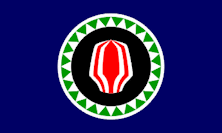Bougainville - Government
 The Autonomous Bougainville Government (ABG) was developed from the peace negotiations (Bougainville Peace Agreement) that concluded the Bougainville Crisis era. The purpose of ABG is to function as the official governing entity within the Autonomous Region of Bougainville and also to represent and advocate for the interests of Bougainvilleans in the national context of Papua New Guinea and in international affairs.
The Autonomous Bougainville Government (ABG) was developed from the peace negotiations (Bougainville Peace Agreement) that concluded the Bougainville Crisis era. The purpose of ABG is to function as the official governing entity within the Autonomous Region of Bougainville and also to represent and advocate for the interests of Bougainvilleans in the national context of Papua New Guinea and in international affairs.
- Legislative - The Legislative operates in the form of Bougainville's House of Representatives (Parliament). This House is seated in the parliamentary buildings in Kubu, Buka.
- Executive - The Executive exists in the form of an elected President of the ABG and the Autonomous Region of Bougainville, Ministers (selected from Members of Parliament) and the Bougainville Executive Council.
- Judiciary - The Judiciary operates in the form of the Courts of Justice that operate within Bougainville. The region also retains the Papua New Guinea Supreme Court as the highest level of its Judiciary system.
ABG governs an autonomous region of Papua New Guinea and is the only region with this political status. This an important distinction as being "autonomous within" rather than "independent from" Papua New Guinea. Bougainville is not an independent sovereign state and therefore ABG cannot conduct certain activities (for example, ABG cannot make laws that contradict the national system of law or establish diplomatic posts in foreign countries).
Voting in elections on Bougainville is voluntary, with polling generally undertaken over several weeks to give mobile polling teams sufficient time to access each area and an adequate opportunity for all Bougainvilleans to participate.122 While counting is often slow, sometimes taking several weeks, election staff are generally well regarded and the results tend to be generally accepted.
The Bougainville Peace Agreement said the ABG and PNG Government will consult and agree on a date for the referendum, between mid-2015 and mid-2020. The timing of the referendum was concurrently subject to Bougainville meeting two prerequisites: namely, the achievement of ‘good governance’ and the implementation of the weapons disposal plan.‘Good governance’ is not entirely defined by the agreement. It will be determined by taking into account ‘internationally accepted standards of good governance’ as applicable in Bougainville and a broader PNG context. Taking into account ‘internationally accepted standards of good governance’ was not easy. What made this conversation more awkward is that PNG itself arguably struggles to meet international ‘good governance’ guidelines.
While there are many different opinions about the best way forward, there appeared to be a remarkable consensus among Bougainvilleans over the need to build a government system grounded in the island’s distinct social and cultural endowments. Rather than a singular reliance on processes of institutional transfer and capacity-building, there is a strong aspiration to build on the foundations of Bougainville’s traditional social forms that have proven to be remarkably resilient and adaptable, most notably during the years when formal government systems had effectively ceased. Borne of recent hardships and a difficult and highly contested colonial history, Bougainvilleans have articulated a strong desire to control their own political and economic destiny, and, in particular, to actively shape and participate in their own system of government. The current post-conflict and reconstruction period is viewed by most as an important opportunity to learn from the past and embark on a new form of institution building capable of more effectively meeting Bougainville’s future needs.
|
NEWSLETTER
|
| Join the GlobalSecurity.org mailing list |
|
|
|

